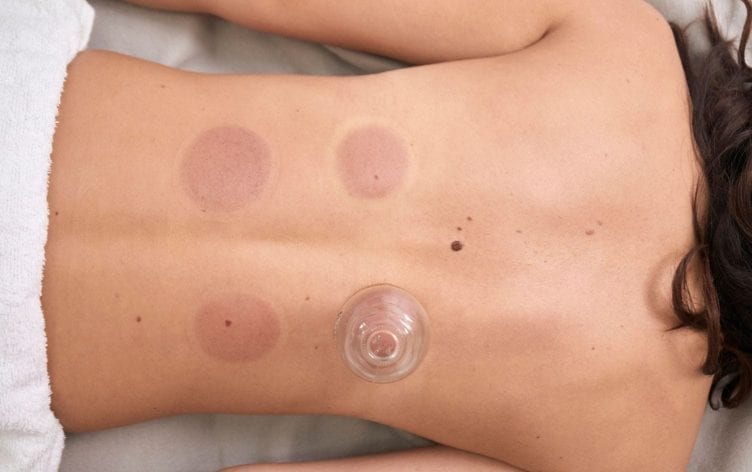
Cupping Is Trending, But Does it Help Recovery?
Alternative treatments geared toward athletic recovery are more popular than ever. See: cryotherapy, dry needling, acupuncture and infrared saunas. Next up? Cupping.
“Cupping is the practice of using circular glass cups to create suction in a specific area as a means of healing,” explains Andrea Orvieto, a doctor of acupuncture and Chinese medicine. The practice has been used in traditional Chinese medicine for thousands of years, but recently became more popular in the western world when Michael Phelps was spotted with cupping marks on his back during the 2016 Olympics.
So why would a professional athlete use cupping to help boost his performance? “Currently, cupping therapy is used to help with pain and muscle tension,” says Ellie Heintze, a licensed acupuncturist and naturopathic doctor. Massage therapy applies pressure downward on your body’s tissues, but cupping is supposed to use negative pressure to create space between the tissue layers, she explains. “This allows for increased blood flow, the release of lactic acid in the muscles and soothing of muscle spasms.” The result? More recovered and better-functioning muscles. Cupping is also traditionally used to treat common colds, phlegm in the lungs and digestive issues.
There are many different styles of cupping: Korean suction cups, silicone cups and glass cups that apply suction with fire, also known as fire cupping. “[They] all work the same way,”Heintze says. “They’re just different methods of applying the suction of the cups to the skin.” Fire cupping is most commonly used for sports recovery.
WHAT SHOULD YOU KNOW BEFORE YOU TRY CUPPING?
YOU’LL PROBABLY NEED MORE THAN ONE SESSION
“Cupping therapy is usually done over the course of three sessions,” says Jamie Bacharach, an acupuncturist. Some people might need more depending on what they hope to achieve through cupping.
NOT EVERYONE IS A CANDIDATE FOR CUPPING
“Patients who are pregnant, have dry skin, have low blood pressure, have open wounds or take blood thinners should make sure to let their practitioner know about these conditions, as they are all contraindicated with cupping,” Bacharach says.
IT’S NOT PAINFUL, BUT IT WILL LEAVE SOME MARKS
Cupping feels like a pulling sensation in the area where the cups are placed — usually on the back. “It isn’t painful at all and the treatments are usually pretty short, around 15 minutes long,” Bacharach says.
You can expect red or purple circular marks afterward. “These marks are caused by the suction rupturing or expanding the small, superficial capillaries.They start to fade about a day or two after the treatment and are usually gone after a week.” If you have a big event coming up, it’s probably best not to have a cupping treatment within a week of it.
IT’S NOT JUST FOR INJURIES
“You don’t have to be injured to receive cupping,” Orvieto notes. “You can do it for preventative reasons, especially if you’re an athlete or work out frequently. Cupping helps facilitate recovery which can help prevent injury.”
THE BOTTOM LINE
Unfortunately, there’s not much research to show cupping works. “The scientific evidence for cupping is currently lacking,” says Grayson Wickham, DPT, certified strength and conditioning specialist and founder of Movement Vault. “There have been numerous systematic reviews that have shown that there is very little evidence to support the efficacy of using cupping therapy.” That said, this is partially due to the way the studies were designed, and “we could see future studies, designed and conducted better, that do you show a benefit to using cupping therapy.”
Research studies aren’t the only thing that matters when it comes to deciding whether or not to try cupping. Like acupuncture and dry needling, experts agree that when performed by a qualified practitioner, cupping is a safe treatment. So, give it a try; the benefits may outweigh the risks.





